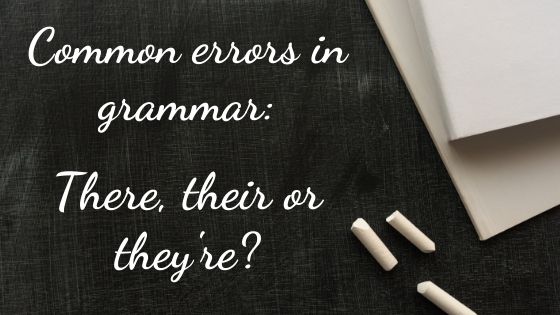In this blog post, the second highlighting common errors in grammar, I am going to address the regular misuse of ‘there, their and they’re’.
The confusion here stems from these words being homophones (they sound the same, but have different meanings.) Therefore, I thought that I would give you a few useful tips and tricks to help choose the correct word.
There
There denotes a place or position, for example:
- Put them over there
- You can go there on a No. 21 bus
- Would you please wait there?
There can also be used with the verb ‘to be’:
- There were too many people on the train, it was overcrowded
- There is plenty of time to go to the airport
- How many people are there waiting for the shop to open?
Their
Their denotes possession, for example:
- The children need to take their books back on Monday
- They put all their clothes into one large suitcase
- The students are still waiting for their results
They’re
And finally, they’re. They’re is quite simply the shortened form of ‘they are’. Therefore, if you could substitute ‘they are’, into your sentence and keep the same meaning, then you can use they’re. For example:
- They’re too late, the performance has already begun
- They’re coming to visit me next week
- They’re going to the gym after work
Common errors in grammar – test
In addition to my tips above, here are a few examples to practise on. You will find the answers at the end of this blog.
- They have parked ________ car in a disabled spot.
- If you leave it over _________, I will collect it later.
- __________ going on holiday this weekend.
- _________ trying to find _______ seats on the train.
- The Scouts pitched ________ tent over _________, under the trees.
- _________ getting married next Saturday and ________ relatives from overseas will arrive next Wednesday evening.
In addition to my tips and tricks, BBC ‘Bitesize’ has a useful online lesson if you are not confident or need to practise: https://www.bbc.co.uk/bitesize/articles/zk2c92p
Quiz answers
So, how did you find my short quiz? Did you use my tips to reach your answers? Here are the correct answers:
- They have parked their car in a disabled spot.
- If you leave it over there, I will collect it later.
- They’re going on holiday this weekend.
- They’re trying to find their seats on the train.
- The Scouts pitched their tent over there, under the trees.
- They’re getting married next Saturday and their relatives from overseas will arrive next Wednesday evening.
I hope that this blog has helped to clarify the use of ‘there, their and they’re.’ I will post more blogs about common errors in grammar from time to time. In the meantime, you can find my first post, which explains the differences between ‘your and you’re’, here.
